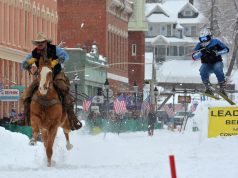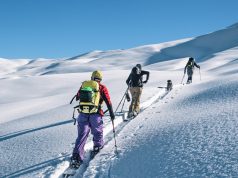
One morning in March, low clouds hung heavy over the springy rubber track behind Boulder’s Manhattan Middle School of Arts. It was a perfect morning for running, if you like that crisp-cool air hitting your chest and reddening your cheeks. At 7:30 a.m. that Tuesday, half a dozen women and men clustered around each other, layering spandex, fleece and polyester shells; slowly, they began to warm up their bodies, swinging their limbs, jogging easy laps, gradually growing faster and faster around the copper-orange track. At the finish-line, a baseball-capped coach shouted numbers from his watch, encouraging the group of long-distance athletes. Among the churning legs and pumping elbows, Nell Rojas was nowhere to be found.
She was miles away from where she was supposed to be; instead of the track, she was at home, in bed, sleeping. The elite marathoner had a hard time falling asleep that night, so she’d let herself snooze, rescheduling her track workout for later that day. “I think that’s the most important thing for self care,” she says, especially with a big race coming up: Be flexible and “make sure you get enough sleep.”
The 34-year-old is resting up for her second “Marathon Monday” attempt on April 18, when she’ll be toeing the Boston Marathon start line, competing again at the world’s oldest continuously running marathon (the first race dates back to 1897 and is now New England’s most widely viewed sporting event). At last year’s Boston Marathon, Nell sent ripples through the running community when, as an unsponsored athlete, she finished as the fastest U.S. woman, in sixth place overall, in a time of 2 hours, 27 minutes, and 12 seconds.
A few days before flying back to Boston in mid-March to review parts of the 26.2-mile course—infamous for its hilly sections—she says,“It’ll be a different race this year.” But she’ll be a different person, too, all the wiser and more motivated as someone returning to a task and defending a title. “There are faster Americans [racing] this year, so I’m nervous about that, but I’m also excited about it, because I know it will lead me to a faster time.”
Though she’s still the down-to-earth, born-and-raised Boulderite who fellow runners and outdoor creatives describe as “humble,” “trusting,” “curious,” “driven,” “incredible,” and “talented,” Nell’s life changed substantially after her October 2021 Boston Marathon performance and the national title she’d won the month before, at the USA Track and Field 10 Mile Championship in September in Washington D.C.; at the beginning of 2022, her success culminated in a running contract with Adidas. (Nell’s first request of Adidas was to help replace a friend’s running gear that was lost along with their home in Boulder County’s Marshall Fire.)
Before this new sponsorship, she’d always worked for herself, “like, hustled really, really hard my whole life,” she says. In college at Northern Arizona University (NAU) she supported herself via athletic scholarship; then, returning to Boulder after graduation, she operated her own gym, training herself for triathlon and obstacle-course racing when she wasn’t coaching classes, teams and personal clients.
Now, a newbie to the professional running scene, she has an hour to nap everyday. Spending more time taking care of herself as an athlete than other people, she says, “is actually a weird mind transition that I’m still working on.”
Finally able to scale back her coaching services this winter, Nell spent a month in Arizona at her first “training camp,” where she and others from the Rojas Running training team—founded and coached by her dad, Boulder running legend Ric Rojas—gathered to live and breathe nothing but speed and form in the high, dry desert landscape. Charging through “more volume and more intensity than I’ve ever done,” Nell says, “all I did was work out, train and recover. It’s amazing how much more you can do when you have that time to recover.”
Running is, afterall, terribly tough on the body. As Nell’s strength-endurance coach, Keith Mueller, says, “If you’re a runner, you’re a put-force-into-the-ground-and-breathe athlete.” Pounding and pressing, a runner’s work is that of a repetitive grind. And if you’re Nell, you’re grinding out miles at a 5:40-minute pace, without wavering, for nearly two and a half hours, foot after foot after foot.

When running, Nell doesn’t like listening to music—it makes her feel claustrophobic, she says. “I need to listen to my breath,” and uses the time to focus on building visualizations in her head: sections of courses at upcoming races, tasks needing to be done at home, what she’ll eat for breakfast.
As a long-distance runner, Nell is somewhat famous for her commitment to strength training, but using weights and doing mobility work in the gym has been a part of her life since she was a kid, playing all kinds of sports, growing up in North Boulder with an athlete for a father. Soccer fields, basketball courts, tracks, softball diamonds—it all existed within a couple blocks of home, where her dad, Ric Rojas, spent hours training himself as an elite runner.
Ric moved to Boulder in the ’70s as a road racer, but “I cut my teeth running trails growing up in New Mexico,” he says. “We’re indigenous Americans from Central Mexico,” and after his grandparents emigrated to Texas, his dad became the first Mexican-American to join the ironworkers union in the ’30s, which eventually brought the family to Los Alamos, New Mexico.
Ric fell in love with running early, and started designing training plans for his high school cross country team after reading mail-to-order books he’d pick out from Track and Field News—training plans that took the team to the state cross country championship podium, he says. As a coach, Ric is completely self-taught. “I made all the mistakes myself, trying to do different things,” he says—it may have been a process of elimination, but now he says he’s found what works.
In any case, the record books speak for themselves. Just for one example: In 1979, Ric won the inaugural Bolder Boulder 10K race; in 2019, Nell went on to win it herself.
The secret to their decades-long, father-daughter coaching relationship is compartmentalization, Ric says. “My job with my kids growing up was to play mostly, and read,” he says. With her two brothers, Nell spent a lot of time at the track, around Ric’s training weights, abiding by his running schedule. And now they have a personal relationship—which sometimes looks like Ric taking care of Nell’s dog a few days a week—but when they talk about running, they schedule time to transition into their coach-athlete relationship—“more analytical and objective”—Ric explains. “I treat her like any other athlete.”
At Boulder High between 2002-2006, Nell was a superstar on the track, cross country course, and basketball court. Shooting hoops together back then, Ric was constantly asking Nell to give him a break: “She would just dribble and run circles around me. Really the only advantage I had over her was I was taller,” he says. “She is just a natural athlete.”
Nell has always run around Boulder (her favorite routes loop near the Boulder reservoir), but she hasn’t always been a runner—competing on the world marathon stage wasn’t always the plan. After running in college, Nell switched to racing triathlons professionally and competed in obstacle course racing. She only ran her first marathon, at age 31, as a training objective in preparation for a future Ironman, a race demanding competitors swim 2.4 miles, bike 112 miles, then run 26.2 miles.
“She ended up running [that first marathon] fast enough to qualify for the Olympic marathon trials,” Ric says, which Nell then raced a few months later, in Atlanta, Georgia, finishing in ninth place. She promptly dropped the triathlon and obstacle objectives to hone in on running.

After Nell’s 2021 Boston performance, Kara Goucher, a two-time Olympian and NBC commentator who lives in Boulder, told the Daily Camera, “I’ve been watching [Nell] build, and I knew she just needed to be in a bigger race for her abilities to stand out. … In fact, I’m the one that told NBC we needed to chat with her before the race because I was so sure she’d do well.”
Ric says Nell is “committed to [marathon racing] long-term, and we’ll probably go through the 2028 Olympics—she’ll be 40 at that time, but, you know, women nowadays can run very well into their late 30s, as evidenced by a lot of really good people,” Ric says. Indeed, among the dozens Nell will compete with at the 2022 Boston Marathon are 42-year-old Longmont resident and Kenya native Edna Kiplagat, and 38-year-olds Stephanie Bruce and Des Linden.
After recovering from the 2021 Boston Marathon, which had been held in October due to COVID delays, Nell promptly began training again for the 2022 race, to be held on its original Monday of Patriots Day Weekend in April. She’ll be emerging from a 16-week training cycle that she and Ric designed, and which is being documented by Boulder filmmaker Nate Castner. At the end of 2021, “we started meeting a couple times a week to cover gym sessions, some of her outdoor workouts, nutrition and mindset things,” Castner says. “She’s really good at connecting with people [and it] shows in our work.”
Nell contacted Castner with a desire to create the YouTube series “Back to Boston,” because “she was interested in getting more female-forward content out there,” Castner says. “There’s a whole bunch of runners who are male and putting out tons of content; she felt like there wasn’t a lot of representation for women.”
In the sixth episode, “How Can I Incorporate Speed Work in Marathon Training? Back to Boston: Conquering the Course,” Nell glides through five-minute miles on Manhattan Middle School of the Arts’ track during a sunny December 2021 workout. And in a video published Feb. 1, 2022 about how she prepares the night before a race, Nell is filmed in her hotel room on the eve of the January 2022 Houston Half Marathon. Nell admits to Castner’s camera: “There are a couple key things I remind myself of again and again. One of them is that you just have to have fun. You have to just let your ego go—number one rule is: Don’t have an ego about this. Don’t care what those people think. Even research shows that’s not going to help you.”
The number two rule, she says, is presence: “Staying in the present helps to calm you down, and it’s good practice, especially for when you get in that race and you’re thinking about mile 12 and your brain starts to panic, and so it brings you back to where you are, because where you are, you’re always OK.”
In Houston, Nell went on to race a personal best—an experience that she and Ric had designed as a critical check-point to see if their Boston Marathon training plans were tracking on target.“She has everything going for her…. her strength and her drive and her desire,” Castner says.
In 2020, Nell spoke at Boulder High School’s graduation commencement: “You may have uncertainty about your future, but it’s OK as long as you keep going,” she said. “Go down many paths to find your own, but remain true to what you love, do it in a way that works for you, and help in a way that inspires you.”
And speaking to the importance of acceptance, in the pre-race Houston video, Nell shares how approaching a big task requires anticipation without fear. “Like, this is gonna happen, and it’s gonna be awesome, and it’s gonna be hard, but that’s what it’s about: instead of avoiding that pain, or being scared of it, just being excited to get there is important.”
No stranger to competition pains, Ric is ready for Nell to hit the starting line: “Let’s go execute it. She knows exactly what to do.”
DETAILS, DETAILS: Marathon Monday, 9 a.m. EST/7 a.m. MST, April 18, NBC Sports and USA Network,
nbcsports.com














